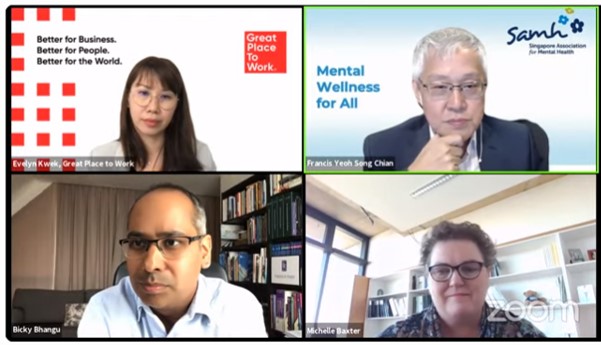How ASEAN can create an inclusive and engaged workforce

As ASEAN continues to plan for the future of work, investment in skills development that focuses on the development of business engagement models for upskilling and reskilling workers needs to be a priority, urged Dato Lim Jock Hoi, Secretary-General of ASEAN.
In his opening remarks at the ASEN Future of Work conference track, which was held concurrently with HR Tech Festival Asia Online 2021, Dato Lim, who is also advisor of the Regional Centre for the Future of Work, added, “Secondly, we need to push for policies that support company investment in skills training, especially among the small and medium enterprises.
“There will also be a need to improve the quality of labour market information and capacity for skills forecasting. In this regard, ASEAN member states should regularly review their existing educational curriculums and skills upgrading pathways.”
Organised in collaboration with Singapore’s Ministry of Manpower and the Regional Centre for the Future of Work, the ASEAN Future of Work conference track brought together regional senior government, union, and employer representatives, to share lessons learnt from COVID-19 on promoting inclusivity in the future of work.
There are several key considerations when deciding how to implement hybrid work, including the importance of how employees feel, highlighted a panel discussion consisting of Sunil Setlur, Global Chief People Officer, GoJek; Hajah Mahuran Saro Dato’ Haji Sariki, Head, Group Research Development & Policy and Head Malaysian Professional Talent, Talent Corporation Malaysia; Najati Ghosheh, Legal Specialist, Inclusive Labour Markets, Labour Relations and Working Conditions Branch, International Labour Organisation.
More employees now want to have the flexible option to go back to the office a few days a week, and it is critical that organisations listen to their people and adjust policies accordingly and continue to provide support for employees, wherever they may be working, the panel discussion, which was moderated by Jacqueline Gwee, Director and Founder, aAdvantage Consulting Group, concluded.
In fostering inclusive workplaces that support well-being and work-life harmony, organisations need to consider the challenges that the external environment has created on employers and employees, said Dr Bicky Bhangu, President, South-East Asia, Pacific & South Korea, Rolls Royce Singapore.
Dr Bhangu was part of a panel discussion that also included Evelyn Kwek, Managing Director, ASEAN/ANZ, Great Place to Work Institute, Singapore and Michelle Baxter, CEO, Safe Work Australia. Moderated by Dr Francis Yeoh, President, Singapore Association for Mental Health, the panel discussion touched on how mental well-being is part of taking care of holistic well-being, and equipping people managers to lead with empathy and to be able to start conversations with distressed employees.
Treat people with trust and respect and create a sense of camaraderie and environment where people feel safe to speak up, the panel added, before highlighting how creating a safe workplace starts with support from top management.
An increased investment in people in terms of reskilling and upskilling, will rank alongside adaptability and the readiness to change as top priorities for organisations in 2022, said Srinivas Reddy, Chief, Skills and Employability Branch, International Labour Organisation.
While agreeing with Reddy, Indranil Roy, Executive Director, Consulting Human Capital Leadership, Deloitte Consulting South-East Asia, urged organisations to move away from the discussion on the “future of work” to “modern work”, which is more representative of what the workforce needs to concentrate on – the here and now, he explained.
“Individuals are more resilient and adaptable than they are given credit for, and we should be supporting what they are already doing well and turn workflows into learn flows in examining ‘modern work’,” Roy added.
The panel discussion, which was moderated by Josie Kang, Vice President, Human Capital, Human Capital Leadership Institute, also highlighted the workforce needs to address skills mismatch and build a learning organisation by developing lifetime learning strategies.
READ: Redefining HR by creating new employee experiences
Over at the main HR Tech Festival Asia Online conference track, Susan Cheong, Managing Director & Head, Talent Acquisition Group, Group Human Resources, DBS Bank, explained how AI has the potential to increase efficiency and redefine the way we look at the future of work and workforce management.
She cited the example of Jobs Intelligence Maestro, or JIM, a virtual recruitment bot powered by AI which DBS introduced in 2018. JIM has allowed DBS to simultaneously engage with all candidates 24/7, resulting in dropout being reduced from 15% to 7%.
Overall, where there is a need to acknowledge the potential and advantages that AI can bring, it is important to understand that HR is a function that still requires human interaction and that is something that machines cannot replace, Cheong emphasised.
The pandemic has presented both challenges and opportunities for organisations to learn, re-learn and un-learn, upskill, and reskill, as well as redeploy, said Drew Fernandez, Global Chief People Officer, Coca-Cola Bottling Investments Group, The Coca-Cola Company
At Coca-Cola, the global brand adopts a people-first culture across the entire employee experience around these key pillars: Be Well, Be Inspired, Be Valued, Be Connected, Be Rewarded, Be Developed. The company’s learning strategy is also based on the belief that development is for all and structured around these value propositions: Human-centric, future-focused, and holistic development so that ultimately, employees want to, and not need to show up for work.
When building a resilient and agile workforce, organisations need to build skills for today and tomorrow, said Olivier Pestel, VP, Solutions Group, Cornerstone OnDemand. Start by anticipating and identifying skills gaps, and work to close these skills gaps and drive employee productivity, through personalised, ubiquitous, and high-impact content, he added.
Organisations then need to create talent agility by improving talent readiness and redeployment and move the company forward with professional growth. They also need to help employees develop agilely through measures such as boosting employee performance with on-demand feedback. Provide employees with the performance insights they want and help them stay on track with flexible goals, Pestel concluded.
Finding candidates and worker reliability are some of the challenges organisations face when hiring for their frontline workforce, a poll conducted during a fireside chat between Matthew Ward, CEO and Founder, Workmate and Bhavani Shankar Mishra, Regional Director, Logistics (APAC), foodpanda.
Commenting on the results, Ward and Mishra highlighted how digital tools can help to automate and drive efficiencies in recruitment, retention, and workforce productivity. For instance, artificial intelligence (AI) can be used for screening during mass hiring for frontline workers, although technologies should not be deployed uniformly across the organisation, because frontline workers have different needs and need to be managed differently from those who work in the office.
What are the challenges and opportunities for APAC’s employers when it comes to holistic well-being? There are three areas to address, suggested Adrian Seligman, Chief Commercial Officer, Top Employers Institute; and Ammara Naeem, Head of Client Success, Top Employers Institute.
First, psychological safety, or a belief that one will not be punished or humiliated for speaking up with ideas, questions, concerns, or mistakes. Mental well-being is also a priority, with research indicating a link between employee health and work performance.
Lastly, organisations can provide employees with the knowledge, tools, and tips to make the best of their financial situation. When organisations can successfully incorporate these hoslistic well-being elements into their people strategy, they are able to increase engagement, discretionary effort and loyalty.
Due to the continued flux of change brought forth by the pandemic, there will be an ongoing evolution of employment frameworks and legislation changes across APAC, highlighted Lisa Christy, Director, HR Service Delivery, Wolters Kluwer Tax & Accounting (APAC).
This will place increased demands on HR practitioners to evolve policies and programmes to support employees, said Christy, who also gave key employment updates in several APAC countries, including Singapore, where there are plans to increase the retirement age to 65 in 2022, while a tripartite committee for workplace fairness is expected to present their findings in the first half of the year.
Powered by ADP, HR Tech Festival Asia Online 2021 took place from September 21-23 and was brought to you by the industry’s global leading HR media and event organisers HR Tech Conference Las Vegas, HRE Magazine US, HRM Magazine and HRM Asia.



